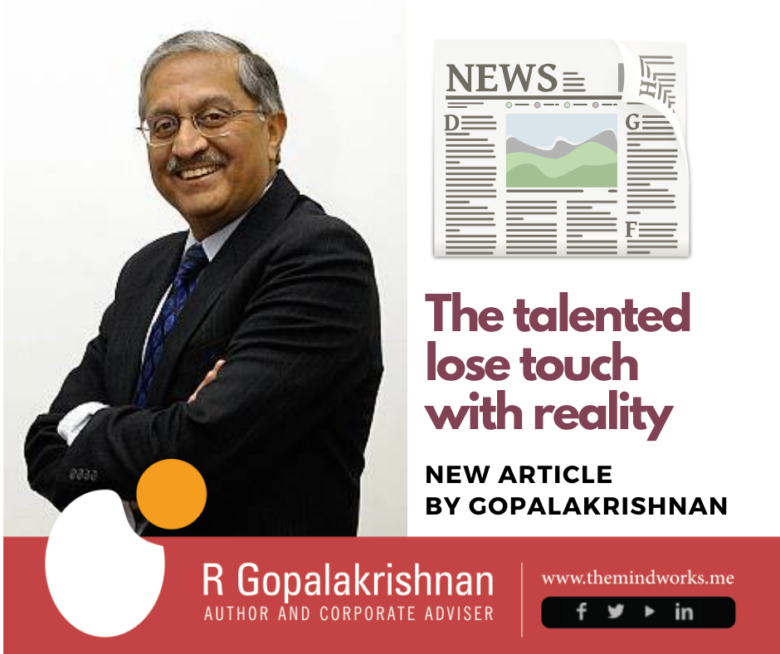6th December 2019 THE WISE LEADER
R. Gopalakrishnan*
(*The writer is an author and corporate advisor. He is Distinguished Professor of IIT Kharagpur. During his career, he was a Director of Tata Sons and a Vice Chairman of Hindustan Unilever.)
Email: rgopal@themindworks.
This year-end I write about the importance of ahankar-mukt leadership. Early next year, I will share how to work at becoming ahankar-mukt. Narcissists are full of ahankar.
I have been advocating that board directors must act on any negative signals that they pick up. I have written a book about power-induced temporary brain damage among business leaders–to be fair, the comment applies equally to national leaders (CRASH: lessons from the entry and exit of CEOs, Penguin, 2019). Just watch political leaders in China, Turkey, America and the BRICs nations, and the debilitating effects of power are so visible. ADB/World Bank report that Nepal, Bangladesh, Indonesia and Vietnam have grown faster than India in recent quarters. Without doubt India faces a growth issue, which must be admitted sensitively before leaders can do something.
In civic life, rising neo-nationalism lurks in many countries. Each country must solve such a problem in line with its culture. History shows what has happened in several countries.
- A long-ruling party progressively becomes ineffective, indolent and corrupt. The affairs of the nation start to drift. The right wingers present themselves as being clear-headed, firm and possessing a no-nonsense approach.
- The ruling party is depicted by emerging right wingers as having taken wrong and anti-national political decisions over their long years in power. Parliament is deliberately weakened. The government’s firm action attracts political controversy.
- The right-wing party quells criticism, blames the past for every woe and repeatedly shames an ‘enemy’, whom they have identified. The right-wing party gradually gains totalitarian control instead of ‘total control’ with consequences which evolve over time.
Just last week, the opposition leader in Peru, Ms Keiko Fujimori, was released after twelve months in jail. She had been charged for illicit campaign money from Brazil, but the charges failed to stick. Noted journalist Swaminathan Aiyar has commented, “Businessmen are terrified of raids by tax authorities……BJP has raided or acted against opponents like P Chidambaram and Sharad Pawar…..BJP had launched nine corruption cases against Ajit Pawar…..these magically disappeared when Ajit offered his hand…” (in the recent Maharashtra shenanigan).
Former PM Dr Manmohan Singh said that business leaders are scared, but saffron supporters argue that the statement is political. Former Speaker and BJP leader, Sumitra Mahajan, has reportedly stated that she used Congressmen to express disagreements for fear of retribution. BJP leader Subramaniam Swamy wrote in his book, Reset, “……lettered but timid economists ….tell the prime minister what he wants to hear…This is a frightening potpourri for the nation.” An extract from former SEBI Chairman M Damodaran’s December newsletter summarizes views of a corporate governance meet as, “…. the time has come, in the interest of all stakeholders, to move from a situation of distrust and terrify to trust and verify.” Veteran Rahul Bajaj delivered a message, provoking a minister to retort that his expression was not ‘in the national interest.’ Kiran Mazumdar Shaw argues that the government treats business as pariahs. In the chambers of commerce, leaders drop their voices as they state their ‘real and strictly private view’ in hushed tones.
Leaders should reflect on these views. Followers judge reality by the actions of the leader, not the profanities of the leader. Recall the experience of Pehr Gyllenhammar, chairman of Volvo from 1970-1994, or Thomas Middelhof of Bertelsman a few years ago, or Carlos Ghosn of Renault Nissan most recently.
A fifteenth century Banarasi sage, Sant Kabir Das said, “Sees Utaarai Haathai Kari, So Paisey Ghara Mahim”, which means he can lead who gives up ego by chopping off his head. Psychoanalyst Michael Maccoby wrote a fine article in the HBR in 2000 about narcissistic leaders, referring to Sigmund Freud’s typology, technically termed erotic, obsessive and narcissistic, though I prefer types 1,2 and 3.
Type 1 comprise those who desperately want people to love them, like Godmen. Type 2 are inner-directed ones who follow rules and instructions and communicate well, like bureaucrats.
Type 3 are independent people and not easily impressed. Type 3 want to be admired, not loved and want to leave a legacy. If they don’t get adulatory response from their followers, they become shrill and insistent, like Ms Indira Gandhi around emergency or Ross Perot, the business tycoon who ran for US Presidency in 1992 and 1996. Type 3 leaders’ characteristics are known from studies in psychology. They are sensitive to criticism, they are poor listeners, they lack empathy, they border on grandiosity and distrust of others and they are ruthless in their pursuit of victory.
Ahankar-mukt leadership is tough, but essential. Happy 2020.

